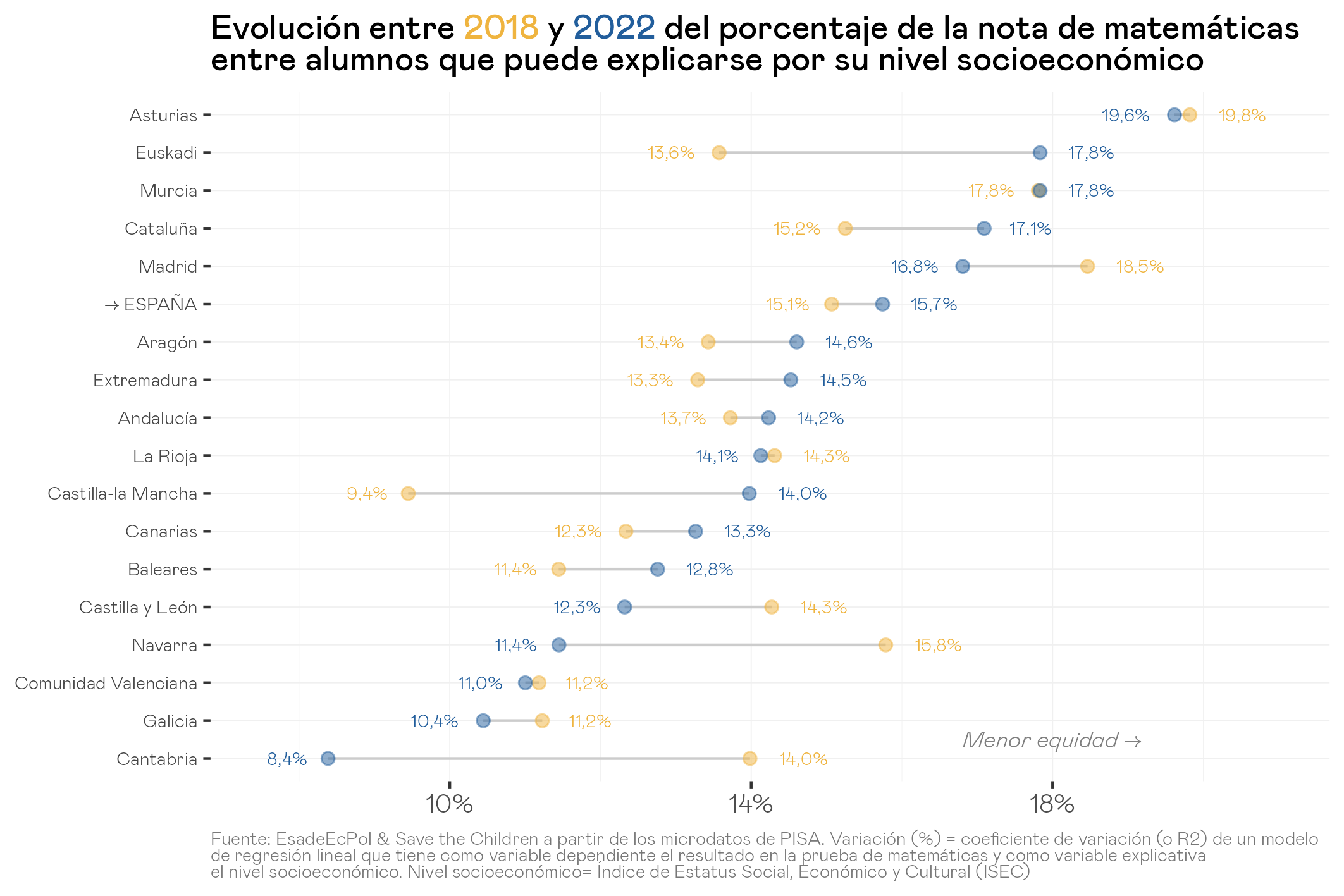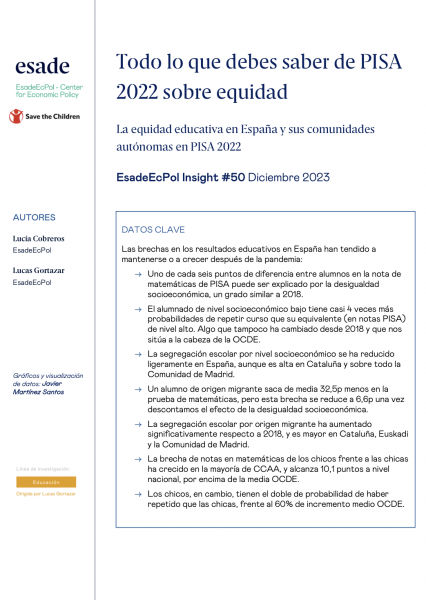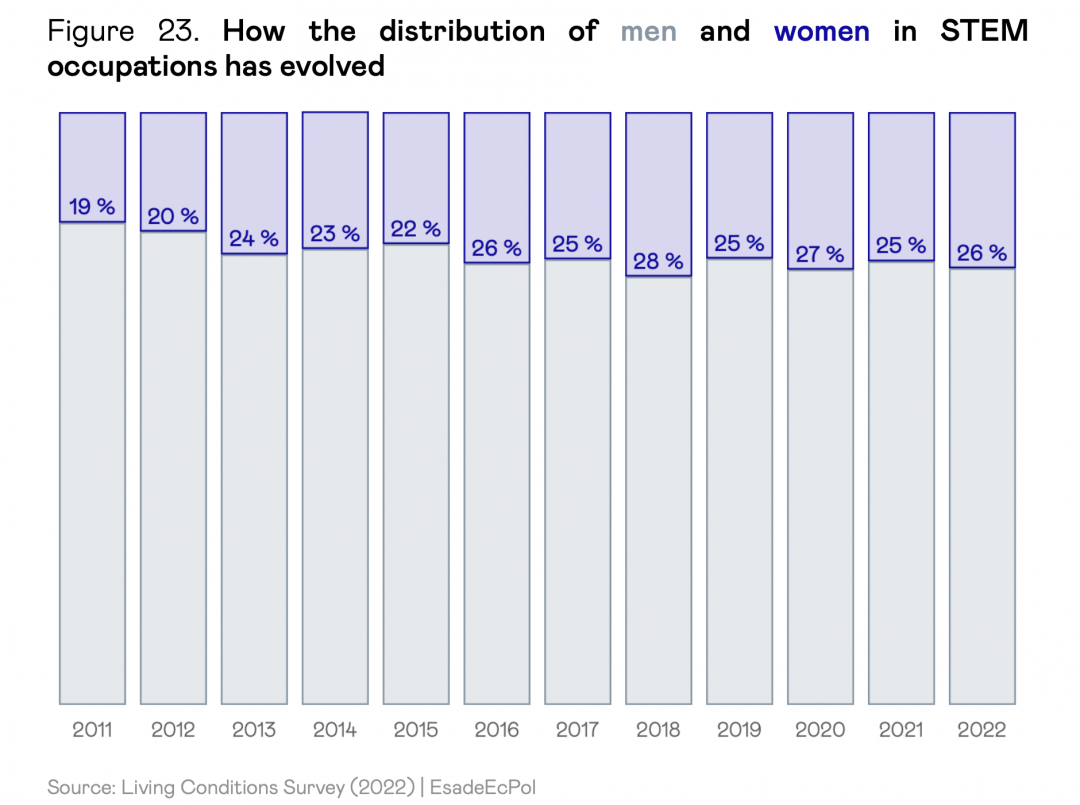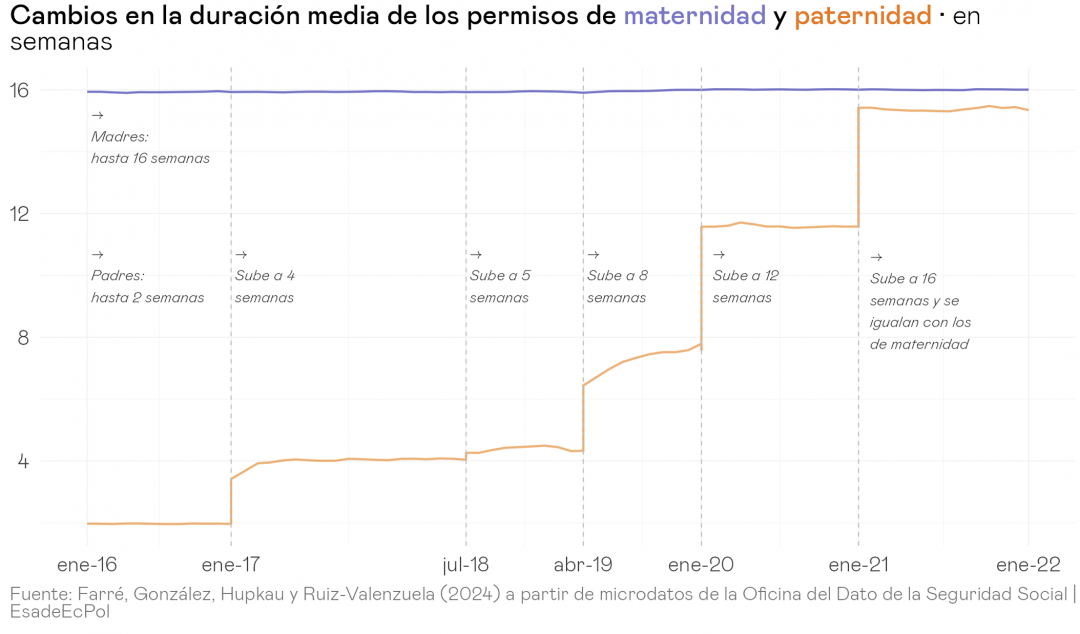
Everything you need to know about PISA 2022 on equity
Lucía Cobreros Vicente, Lucas Gortazar
11 Dec, 2023
Key Data
The gaps in educational outcomes in Spain have tended to remain stable or increase after the pandemic:
→ One out of every six points of difference between students in PISA mathematics scores can be explained by socioeconomic inequality, a degree similar to 2018.
→ Students from a low socioeconomic background are almost 4 times more likely to repeat a grade than their counterparts (in PISA scores) from a high level. This has not changed since 2018 and places us at the forefront of the OECD.
→ School segregation by socioeconomic level has slightly decreased in Spain, although it is high in Catalonia and especially in the Community of Madrid.
→ A student of migrant origin scores, on average, 32.5p less in the mathematics test, but this gap is reduced to 6.6p once the effect of socioeconomic inequality is discounted.
→ School segregation by migrant origin has significantly increased compared to 2018, and is higher in Catalonia, the Basque Country, and the Community of Madrid.
→ The gap in mathematics scores between boys and girls has grown in most Autonomous Communities, reaching 10.1 points at the national level, above the OECD average.
→ Boys, however, are twice as likely to have repeated a year than girls, compared to the 60% average increase in the OECD.
This report assesses the state of equity or equality of educational opportunities in Spain and its autonomous communities, using a detailed and unique analysis of PISA 2022 microdata, comparing it with 2018 data. Understanding educational equity is crucial for the social and economic future of a country, the real opportunities of young people, and present and future human capital and social cohesion. This is particularly relevant in Spain, which has a historically high rate of school failure, which persists.
Obtaining the general decline in results following the pandemic, the report evaluates outcomes in learning (math scores), grade repetition, and school segregation by socioeconomic status in specific centers, national origin, and gender.
For socioeconomic level, the findings include:
– The difference in mathematics performance in Spain that can be attributed to socioeconomic level is 16%, similar to the OECD average and has not changed substantially since 2018. At the regional level, Asturias (20%), the Basque Country, and Murcia (18%) have the greatest inequity.
– The proportion of students who have repeated a grade has been reduced from 28% (2018) to 22% affected by the automatic promotion measures taken at the end of the confinement in May 2020. Even so, repetition in Spain remains unfair: at equal scores in mathematics, a student from a disadvantaged background is almost 4 times more likely to repeat than a counterpart from a high socioeconomic background, something that has not changed since 2018. This is the second highest gap in the OECD. Repetition is more unequal in all the ACs with respect to the OECD average, led by Murcia, La Rioja and Castilla y León, with a considerable worsening since 2018.
– School segregation by socioeconomic level is below the OECD average. Since 2018 it has been reduced in almost all the ACs, but it is especially high in the Community of Madrid -despite its improvement- and Catalonia.
Regarding inequalities by migrant origin the results show that:
– A student of migrant origin (first or second generation) scores on average 32.5p less in the mathematics test than one of national origin, but this gap is reduced to 6.6 points once we discount the effect of socioeconomic inequality between both groups. In this last indicator, the gaps are much higher in the Basque Country (35 points), Galicia or Aragon.
– In most of the ACs, the drop in results with respect to 2018 has been higher in students of national origin. Catalonia presents especially pronounced drops for those of migrant origin.
– School segregation by migrant origin has increased significantly with respect to 2018, both nationally and in several ACs, and is higher in Catalonia, Euskadi and Madrid.
In terms of gender inequalities, we observe:
– 10 points on average for boys with respect to girls in mathematics, somewhat above the OECD average (8.9 points). This difference has increased substantially in 13 of the 17 autonomous regions, being higher in Cantabria (17.4 points) and the Community of Madrid (15.1 points), and lower in Catalonia and the Basque Country.
– In terms of grade repetition, with equal performance, boys are twice as likely to have repeated grades at age 15 than girls.
In order to continue improving equal opportunities and educational equity in Spain, we propose 6 blocks of measures:
- To bet much more decisively than to date on individualized tutoring and reinforcement or in small groups, both during school hours and outside of school hours.
- Improve access to quality early childhood education from 0 to 3 years of age for children with low socioeconomic status and of migrant origin.
- Promote faculty training focused on greater efficiency and practical skills in classroom management in heterogeneous classes, as well as training associated with reflecting on and changing beliefs and pedagogical practices related to grade repetition.
- Implement measures against school segregation in the autonomous communities to reduce the concentration of disadvantaged, migrant and gypsy students. These plans should focus on the effective free provision of subsidized schools and consider demand and admission criteria, but also evaluate supply and planning measures in the school network, especially in a context of demographic decline.
- To bet on extended school days, ensuring free school materials, canteens, and transportation for children in poverty and their access to sufficient scholarships to promote their permanence in school and their continuity in post-compulsory education.
- Provide extra resources and promote reductions in student/teacher ratios in schools with the most disadvantaged students.


Economist focused on education, with interest in health, gender and competition. Degree in Economics from the University of Cantabria, Master in Industrial Economics and Markets (UC3M).
View profile


